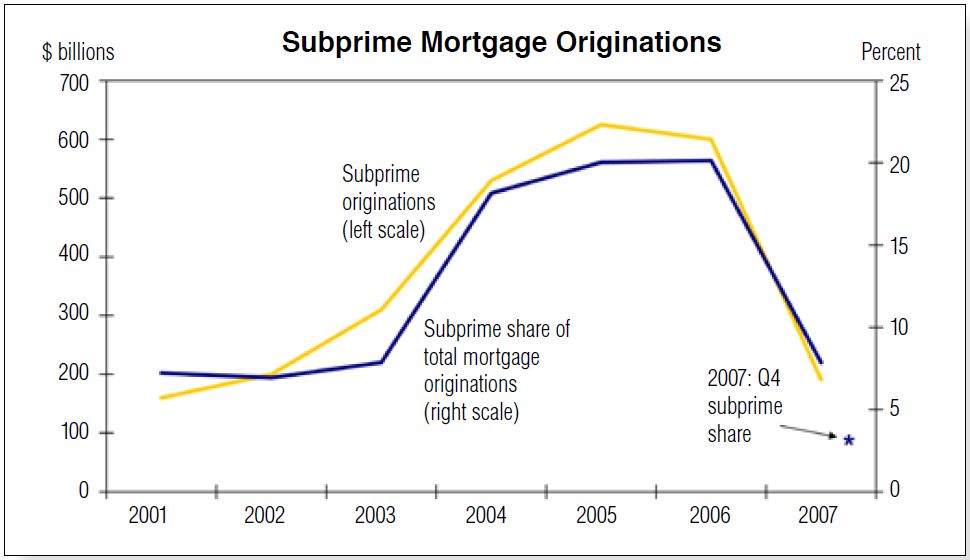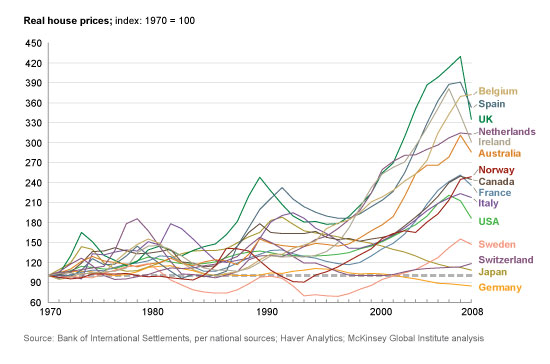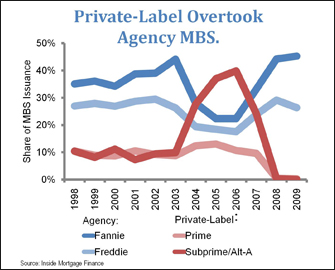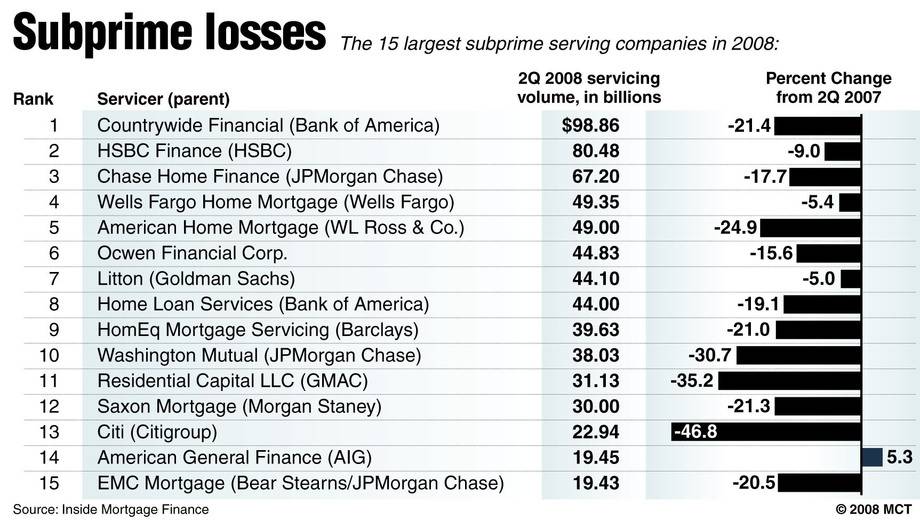Yeah, Bush "warned" there was a problem but blocked any reform. Barney Frank was a powerless minority congressman incapable of blocking anything the GOP controlled House wanted to pass.
The Democrats in the Senate filibustered any change to housing. You do know what a filibuster is do you not?
Bullshit! You do know what bullshit is do you not?
In order to filibuster a bill the GOP senate leader must bring the bill to the floor for a vote. The one reform bill, HR 1461, that got out of the House over Barney Frank's objections was killed in the GOP senate without a vote to filibuster! The GOP controlled Senate sent it to the Committee on Banking, Housing, and Urban Affairs to die without a vote.
Here is what really happened.
In 2003, 5 years ago, Republicans took control of the Senate. On July 31, 2003, in the 108th Congress, recognizing the dangers in Fannie and Freddie, and after hearings where Fannie and Freddie were taken to the carpet for improper practices, Senators John Sununu (R-NH), Chuck Hagel (R-NE) and Elizabeth Dole (R-NC) introduced legislation to strengthen and improve the oversight of Fannie Mae and Freddie Mac. Trent Lott and John McCain were co-sponsors. This bill (S. 1508) passed the Senate Banking Committee, with Democrats opposing. With the opposition by Democrats, traditionally seen as evidence that a bill will never pass the 60-vote cloture rule for a floor vote, the bill died in the 108th Congress.
On January 26, 2005, hoping for a different result in the new congress, Sununu, Hagel, and Dole re-introduced legislation (S. 190) to improve oversight of Fannie Mae and Freddie Mac. The bill incorporated many provisions of the Sununu, Hagel, Dole legislation from the prior congress. It passed out of the Committee on another party-line vote of 11 9 on July 28, 2005. But again, without a single Democrat vote, the bill was doomed if brought to the floor for the critical 60-vote cloture. Only 41 Democrat votes would doom it. In a growing negative atmosphere created by the left based on the war in Iraq and Afghanistan, a fight over an unreported crisis brewing in Fannie Mae and Freddie Mac was likely considered futile. Again the bill was not scheduled to go to the floor where Democrats would certainly have defeated it by voting against cloture and prevented an up or down vote.
In May 2006, John McCain signed on as a co-sponsor of the stalled bill, in the hopes of gathering more co-sponsors and getting a vote in the 109th Congress before the bill would die. McCain would state, I join as a cosponsor of the Federal Housing Enterprise Regulatory Reform Act of 2005, S. 190,to underscore my support for quick passage of GSE regulatory reform legislation. If Congress does not act, American taxpayers will continue to be exposed to the enormous risk that Fannie Mae and Freddie Mac pose to the housing market, the overall financial system, and the economy as a whole. The bill did not obtain any of the necessary support from the Democrats, and once again, the bill died when the 109th Congress ended.
On March 14, 2006, Sununu and Hagel (R-NE) introduced an amendment to the Lobbying Reform Bill that would review the lobbying activities of GSEs such as Fannie Mae and Freddie Mac. Fannie Mae and Freddie Mac were becoming powerful lobbyists, funneling huge amounts of campaign money to Senate leaders, including Chris Dodd, Barack Obama and Hillary Clinton. Of the top 25 recipients, 18 were Democrats with top Democrats exceeded 6-figure contributions from these federally-backed and controlled institutions. The amendment would have directed the Government Accountability Office (GAO) to study the lobbying activities of GSEs to determine whether these activities further their statutory housing mission. The amendment would also require the Secretary of Housing and Urban Affairs (HUD) to conduct annual audits of the Fannie Mae and Freddie Mac Foundations. The Amendment was defeated along party lines.
On April 12, 2007, Sununu, Hagel, Dole, and Senator Mel Martinez (R-FL) re-introduced legislation (S. 1100) to improve oversight of GSEs. The major reforms in their bill were included in final legislation passed the Senate on July 26, 2008 and was signed into law on July 30, 2008. But it was too late, with the lending industry already beginning to fall, led by Fannie Mae and Freddie Mac.
I highlighted the reason these bill didn't get Democrat support in the next to the last paragraph.
Interesting how you answered my post in reply to someone else's post. I guess you didn't want people to see you claimed the Dems filibustered all the bills since not one of the bills you cited was filibustered. In fact not one of them was brought to the floor for a vote to present the opportunity for a filibuster. You claim it is the Dems fault the GOP majority never brought the bills to the floor for a vote, but that is BS. The bills did not have GOP support outside of committee and even Bush didn't support them, which is why they were never brought up for a vote.
For example, the bill S 109 is the Senate version of HR 1461 that I posted. Bush was opposed to the bill and the Conservative AEI called it "A GSE "Reform" That Is Worse than Current Law." Democrats unanimously supported HR 1461 in the Financial Services Committee. A majority of Democrats supported it on the
floor, though Congressman Frank and others voted against it because of unrelated restrictions it placed on the Affordable Housing Trust Fund. The bill passed the House, but the Bush administration and Senate Republicans opposed the Oxley bill. Senate Democrats offered the House‐passed Oxley bill in
that chamber, but Senate Republicans, who held the majority, lacked the votes to pass the bill. They
took no action on any bill.
S 1100 was just S 109 reintroduced and it too died in committee. It had nothing to do with the reform legislation, HR 3221, introduced by House Speaker Nancy Pelosi on 31 July 2007 that the Dem controlled Congress passed and became law July 30, 2008, it is just the Right trying to take credit for what the Dems accomplished. The Republican Congress Talked About Financial Reform, But Did Nothing for 5 years from 2003 until they lost control of Congress in 2007. The Dems had reform passed and signed in about a year and a half after taking over.
Here are quotes from the GOP objecting to the reform bill the Dems passed that you claimed was essentially S 1100 (which was S 109/HR 1461 resubmitted), which you also claim the GOP supported:
We*still*have*to*remember*that*millions*of*people*have*homeownership*opportunities*due*to*a
subprime*market.*I*am*very*leery*of*any*legislation*that*could*undercut*that*market*.*.*.*We*should*also*
take*note*about*what*is*happening*in*the*marketplace*now.*The*market*has*a*wonderful*ability*to*
correct*itself.*
* ‐‐Rep.*Jeb*Hensarling*(R‐TX),*October*24,*2007*committee*hearing*
This*increasing*availability*and*affordability*of*subprime*mortgage*credit*is*and*has*been*an*important*
factor*leading*to*the*increase*in*home*ownership*in*recent*years.*This*bill*may*well*limit*now*the*
products*available*to*subprime*borrowers,*particularly*minority*borrowers,*and*will*deprive*many*of*
those*consumers*from*owning*or*maintaining*a*home*.*.*.*What*we*need*to*do*is*ensure*that*it*does*
absolutely*nothing*to*home*ownership,*particularly*among*minority*communities*who*have*benefited*
from*the*innovations*that*have*occurred*in*the*marketplace.*
* ‐‐Rep.*Scott*Garrett*(R‐NJ),*November*6,*2007*committee*markup*
House Committee on Financial Services 6
I*believe that the free market does the best job of providing affordable and accessible products. And I do
think*that*includes*mortgages.*Through*legitimate*innovation*in*the*private*mortgage*market,*more*
people*are*able*to*get*mortgages*at*lower*rates*than*ever.*
‐‐Rep.*Gresham*Barrett*(R‐SC),*October*24,*2007*hearing*
Really,*we*have*a*very*efficient*mortgage*system*today.*It*is*the*envy*of*the*world.*It*has*brought*record*
homeownership.*A*lot*of*people*have*benefited*from*our*mortgage*industry*and*the*sophistication*and*
the*creativity*that*has*come*from*it.*
‐‐Rep.*Randy*Neugebauer*(R‐TX),*October*24,*2007*hearing







